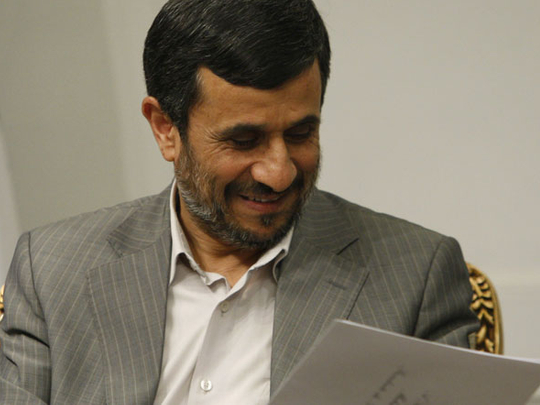
After three decades of acrimonious defiance towards the US, Iran finally appears ready to sit down and talk things out with its old adversary; and this comes with growing realisation in the Islamic republic that strained US ties are at the very roots of its nuclear problems with the outside world.
All but isolated and facing risks of military confrontation with the US or Israel, Iran now openly acknowledges America’s clout in cobbling an international coalition to stop the country from acquiring a nuclear weapon — to the extent that even the most intransigent voices in the regime have joined a swelling chorus of calls for rapprochement with the Great Satan.
“We will talk to America even in the bowels of hell if our interests demand it,” said Mohammad Javad Larijani, a conservative politician and brother of two of the most powerful men in Iran — speaker of parliament and the head of judiciary.
What makes this about-face so imperative for Iran is the dismal state of its economy, strangled by global sanctions, poor management and political uncertainty. These, along with a fierce power struggle inside the regime, have reduced the country to its worst shape since the 1980-88 war with neighbouring Iraq.
Denied of a big portion of its vital oil revenue and strapped for cash, the government has halted most development projects, which have in turn cut the economic lifeline to the country’s already-anaemic private sector.
As a result, unemployment and inflation have skyrocketed and rial, the national currency, has lost over 300 per cent of its value since President Mahmoud Ahmadinejad assumed power seven years ago with two major promises: justice for all, and Iran’s “inalienable right” to nuclear technology.
These slogans are now the butt of all jokes in Iran: the first goal is nowhere near to be seen, and the second is dangerously stumbling in face of an international resolve to deny Iran nuclear weapon capability. As things stand, there are only two choices left to Iran: capitulate to the will of the international community or find its place back into the heart of the Great Satan.
There are growing signs, though, that the Islamic republic may opt for the latter. “The nuclear problem is no longer a legal matter and it has been turned into a political issue. It must be resolved in the context of US-Iranian relations,” Ahmadinejad said last week.
This is not the first time the formerly defiant president has called for direct talks with the US toward normalising relations severed in the aftermath of the 1979 Islamic revolution, when radical Iranian students seized the US embassy and held its staff hostage.
But these overtures have fallen flat for a myriad of reasons — not the least Ahmadinejad’s controversial remarks, his lack of credibility in the West as a responsible leader, and perhaps because they lacked the outright endorsement of Iran’s supreme leader Ayatollah Ali Khamenei.
Granted the final say on all strategic matters in Iran, Khamenei has vetoed all previous attempts to restore diplomatic ties with arch foe, America, and only allowed limited talks on issues of mutual interest between the two governments, such as Iraq and Afghanistan; Tehran and Washington have also been in contact as part of the wider nuclear negotiations between Iran and six world powers known as 5+1.
There are no signs that Khamenei has given his ultimate blessing to efforts to restore relations with the US, although some of his closest aides have come out in support of the initiative. This is a rather tradition in the Islamic Republic of Iran when it comes to sensitive controversial issues: the idea is first floated for a long debate before the supreme leader jumps in to add his voice and settle it for good.
The question of renewed ties with America too has turned into a strategic “national project,” with extreme voices always clashing, offering a broad gamut of solutions — from outright antagonism to putting the matter to public referendum. But the gap continues to narrow, with nearly everyone conceding the need to end hostilities with the superpower; and the Iranian president has been one of the most enthusiastic advocates.
Ahmadinejad has come a long way since his early extremist postures, and he appears to have wised up to the gravity of the predicament he has helped to create for his country. But this awareness may have come too late for him to make any difference. Just months before the end of his second term as president, he is reduced to a lame duck, and even his most ardent supporters are counting the days for him to leave office.
It is yet unclear how the US will respond to a possible overture from Iran, and whether any such talks will take place before the end of Ahmadinejad’s presidency in August 2013. But the re-election of Barack Obama has at least temporarily lifted the shadow of war and the US president’s promise to double efforts for a diplomatic solution to the nuclear conflict may lead to efforts to address bilateral ties as well.
Any serious and continuous dialogue between the estranged former allies could result in better understanding of each other and produce the good-will long remained buried under the ash of hostile rhetoric.
Iran, for its part, is concerned that reaching out to the superpower from a weak position may be interpreted as total surrender, tantamount to what Ayatollah Khomeini called as “swallowing poison.” This is the metaphor the late Iranian revolutionary leader used to describe his feeling in August 1988 when he was forced to sign a peace agreement with Saddam Hussain. That ‘poison’ certainly did Iran more good than bad until it got itself into another problem. So his successor might as well drink it.
Mehrdad Balali is a journalist and writer living in California. His novel Houri was recently published in New York.









